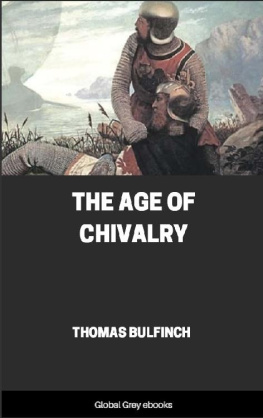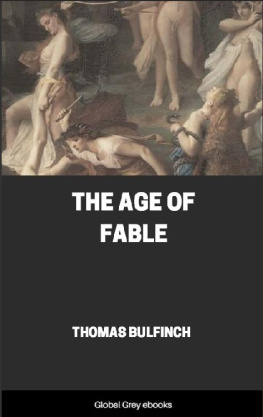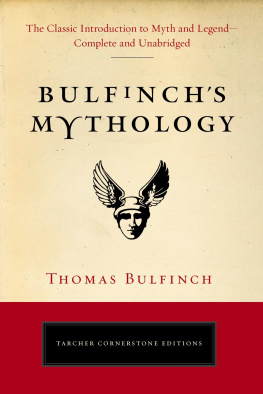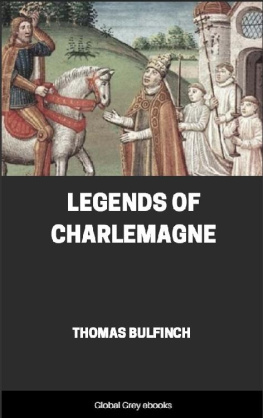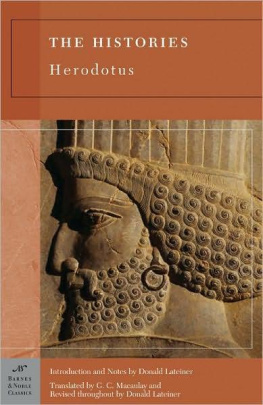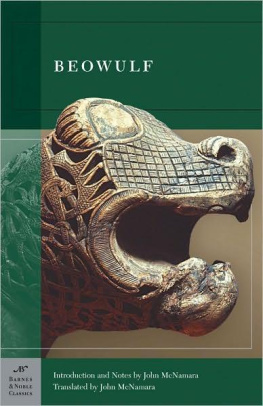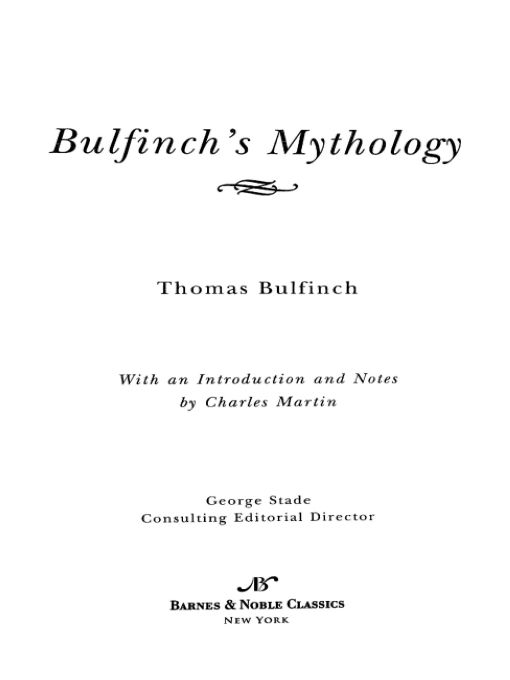
Table of Contents
From the Pages of Bulfinchs Mythology
If no other knowledge deserves to be called useful but that which helps to enlarge our possessions or to raise our station in society, then mythology has no claim to the appellation. But if that which tends to make us happier and better can be called useful then we claim that epithet for our subject. For mythology is the handmaid of literature; and literature is one of the best allies of virtue and promoters of happiness.
(Preface, page 7)
In Xanadu did Kubla Khan
A stately pleasure-dome decree,
Where Alph, the sacred river, ran
Through caverns measureless to man,
Down to a sunless sea.
Samuel Taylor Coleridge
(Proserpine, pages 61-62)
Venus, playing one day with her boy Cupid, wounded her bosom with one of his arrows. She pushed him away, but the wound was deeper than she thought. Before it healed she beheld Adonis, and was captivated with him. She no longer took any interest in her favourite resortsPaphos, and Cnidos, and Amathos, rich in metals. She absented herself from heaven, for Adonis was dearer to her than heaven.
(Venus and Adonis, page 69)
What was that snakyheaded Gorgon-shield
What wise Minerva wore, unconquered virgin,
Wherewith she freezed her foes to congealed stone,
But rigid looks of chaste austerity,
And noble grace that dashed brute violence
With sudden adoration and blank awe!
John Milton
(Perseus and Medusa, page 114)
neas parted from Dido, though she tried every allurement and persuasion to detain him. The blow to her affection and her pride was too much for her to endure, and when she found that he was gone, she mounted a funeral pile which she had caused to be erected, and having stabbed herself was consumed with the pile. The flames rising over the city were seen by the departing Trojans, and, though the cause was unknown, gave to neas some intimation of the fatal event.
(Dido, page 245)
Ah, Launcelot! my knight, truly have I been told that thou art no longer worthy of me!
(The Story of Launcelot, page 412)
In the last decade of the twelfth century Richard I. of England took the cross, which had come to him as a sort of legacy from his father, and sailed for Antioch, which was being besieged by the Christians, to assist in the war in the Holy Land.
(King Richard and the Third Crusade, page 591 )
Charlemagne, or Charles the Great, succeeded his father, Pepin, on the throne in the year 768. This prince, though the hero of numerous romantic legends, appears greater in history than in fiction. Whether we regard him as a warrior or as a legislator, as a patron of learning or as the civilizer of a barbarous nation, he is entitled to our warmest admiration.
(Introduction to Legends of Charlemagne, page 669)
France was at this time the theatre of dreadful events. The Saracens and the Christians, in numerous encounters, slew one another.
(Medoro, page 748)
I receive thy homage, and pardon thee the death of my son, but only on one condition. You shall go immediately to the court of the Sultan Gaudisso; you shall present yourself before him as he sits at meat; you shall cut off the head of the most illustrious guest whom you shall find sitting nearest to him; you shall kiss three times on the mouth the fair princess his daughter, and you shall demand of the sultan, as token of tribute to me, a handful of the white hair of his beard, and four grinders from his mouth.
(Huon of Bordeaux, page 820)
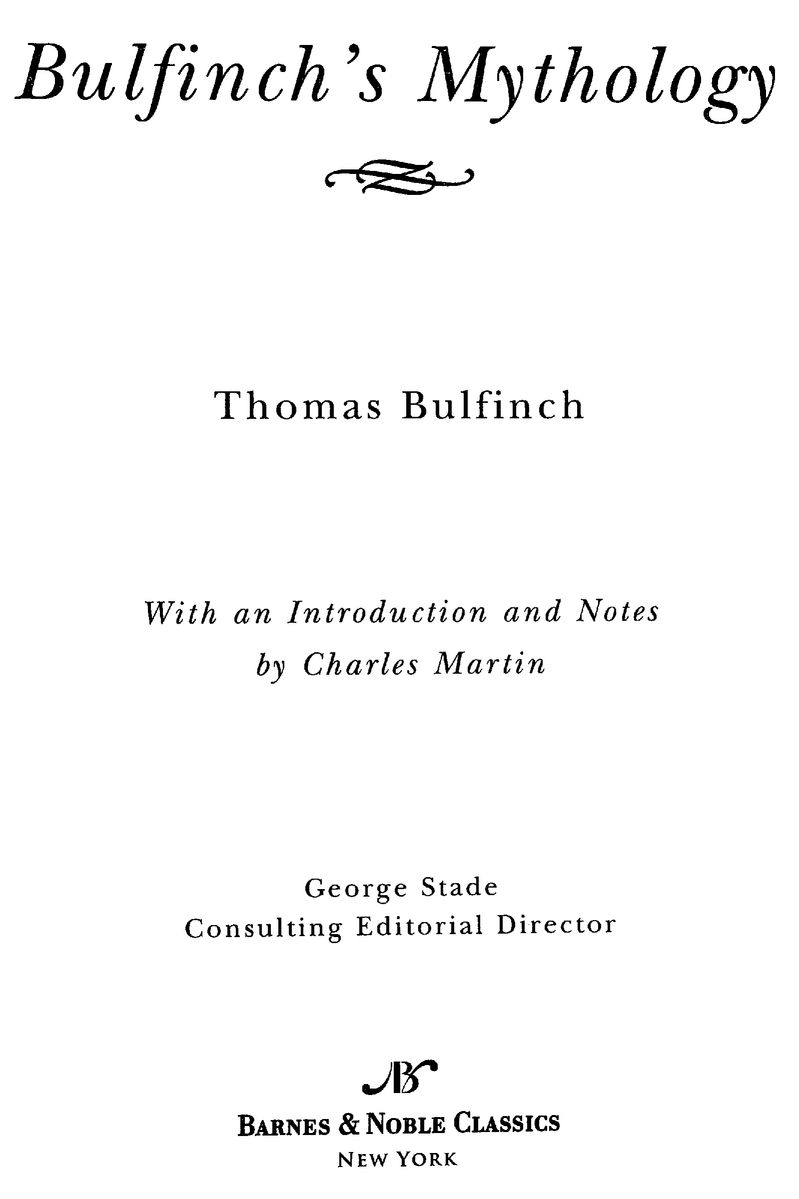
Thomas Bulfinch
Thomas Bulfinch was born in Newton, Massachusetts, on July 15, 1796, to Hannah Apthorp Bulfinch and noted architect Charles Bulfinch, both from wealthy and distinguished Boston families. Charles was financially destroyed by bad real estate investments, but Thomas received an excellent education; his years at Boston Latin School, Philips Exeter Academy, and Harvard gave him a foundation in the humanities and the classic Latin texts that he would later put to use in Bulfinchs Mythology.
After graduating from Harvard in 1814, Bulfinch embarked on business ventures in hardware, textiles, and merchandising, with little success or pleasure. In 1837 he took a position as a clerk at the Merchants Bank of Boston and remained there the rest of his life. He spent his evenings reading and writing and in 1853 published his first book, Hebrew Lyrical History, a reorganization of the biblical Psalms into a historical narrative.
Two years later, nearing the age of sixty, Bulfinch published The Age of Fable, the first of the books that, along with The Age of Chivalry (1858) and The Legends of Charlemagne (1863), would come to be collected in Bulfinchs Mythology. His Poetry of the Age of Fable (1863) and Shakespeare Adapted for Reading Classes and for the Family Circle (1865), though little known today, were also popular. He based another work, The Boy Inventor (1860), on the life of his protg Matthew Edwards. Oregon and Eldorado, about the explorations of the Pacific Northwest, was published in 1866. Thomas Bulfinch died the next year and is buried in the family plot in Cambridge, Massachusetts.
The World of Thomas Bulfinch and Bulfinchs Mythology

| 1796 | Thomas Bulfinch is born in Newton, Massachusetts, on July 15, to Charles, a prominent architect who designed the Massachusetts State House and other noted buildings, and Hannah Apthorp Bulfinch. Charles and Hannah are cousins; both are from distinguished and wealthy Boston families. |
| 1805 | Thomas enrolls in the Boston Latin School. |
| 1807 | Charles loses his fortune when a real estate investment fails. William Wordsworths Ode: Intimations of Immortality appears. |
| 1810 | Thomas graduates from Phillips Exeter Academy and enrolls in Harvard College, where he pursues a traditional humanities curriculum. |
| 1811 | Charles is imprisoned briefly for debt. |
| 1812 | War with Britain begins. |
| 1814 | Bulfinch graduates from Harvard and begins to teach at the Boston Latin School. Francis Scott Key writes The Star Spangled Banner. |
| 1815 | Jane Austens Emma is published. |
| 1818 | President James Monroe appoints Charles Bulfinch architect of the U.S. Capitol. Bulfinch and his parents move to Washington, D.C. |
| 1820 | The Missouri Compromise is passed, admitting Missouri to the Union as a slave state and Maine as a free state, and prohibiting slavery from then on in territories north of Missouris southern border. |
| 1826 | James Fenimore Cooper publishes The Last of the Mohicans. |
| 1828 | Noah Webster publishes American Dictionary of the English Language. |


